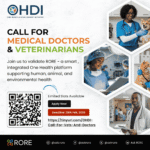Meet our April 2024 Personality of the Month: Dr. Simon Doherty
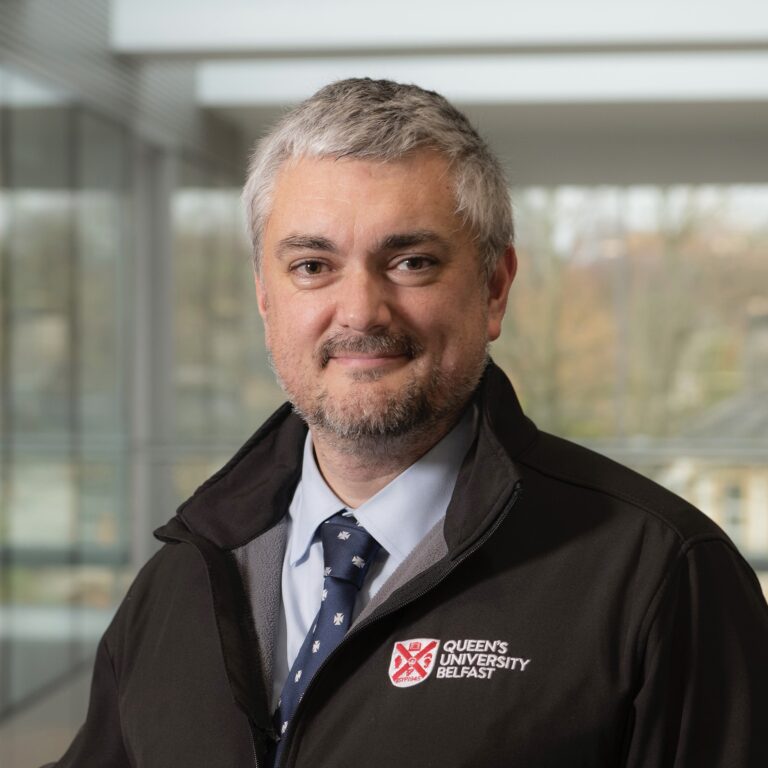
We are delighted to shine a spotlight on Dr. Simon Doherty, a true ambassador of One Health!
Dr. Doherty has been awarded the prestigious 2024 World Veterinary Association Award for One Health. His outstanding contributions to the veterinary profession and his dedication are truly commendable and deserving of recognition. In this exclusive interview with OHDI, he shares his inspiring story and impactful work.
Hello Dr. Simon Doherty, thank you for being our One Health Personality of the Month for April 2024!
Please introduce yourself to us, telling us about your profession, educational background, including your past and current experience in relation to One Health.
I’m a veterinary graduate (University of Glasgow, 2000) and have spent time in general farm animal & equine practice in Scotland, and at home in Northern Ireland. Following a spinal injury, I moved into a role in a start- up company before spending over 7 years at the Agri-Food & Biosciences Institute as a Veterinary Research Officer. From there, I moved into another start-up company before taking up a role working for the UK Government Department for International Trade, where I was the Sector Specialist for Animal Health & Aquaculture. I’d always had a keen interest in ‘veterinary politics’ and professional representation and have had a lot of committee roles; I was elected as the President of the British Veterinary Association in 2018/19. My interest in sustainable animal agriculture, and more latterly sustainable aquaculture, is long-standing and it was from that background that I increasingly became aware of ‘One Health’ and how it linked to animal welfare and to sustainability in the broadest sense.
Could you please tell us why you chose to align your profession with One Health and why you think it is an important field?
Each of us cannot tackle grand challenges on our own but we can rapidly generate impact when we work together across and between disciplines. My background was in production animal medicine – in terrestrial and sea farms – but I became conscious that just working on the vet-farmer-animal relationship alone was insufficient. Collectively, we need to have a more joined-up approach to health, welfare, nutrition, genetics, the environment… and, so, we had to work together and with welfare scientists, nutritionists, genetics companies, agronomists, biodiversity experts, government and many, many other stakeholders… including processors, retailers and consumers across the food supply network. And that was before we even started thinking about AMR, the management of zoonotic diseases, or our relationship with our companion animals! So, One Health piqued my interest because it was about seeking out solutions through improved communication, collaboration, education and mutual understanding across and between disciplines and stakeholders.
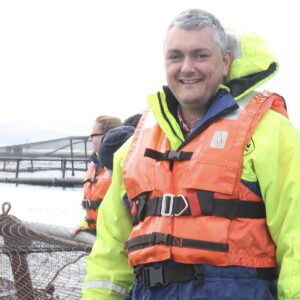
Tell us about your work with The AMR & One Health Lab at Queen’s University Belfast. Why was it set-up and what are the core goals of the Lab?
The AMR, Microbiome & One Health Lab at Queen’s University was established by Dr Linda Oyama, and I was thrilled when Linda invited me to join her as Co-Lead. We have a very active research group covering a range of projects in the AMR space including investigations into the rumen microbiome, plant-extract based feed additives, investigation & control of bovine mastitis and predicting the bioactivity of the antimicrobial peptides. Whilst based in Belfast and with some projects based on local farms, our reach is global and our team includes scientists from Africa, Asia, North America and Europe.
How has The AMR & One Health Lab at Queen’s University Belfast been able to foster stakeholder inter-sectoral and multidisciplinary action to achieve its goals? Please provide examples.
The Institute for Global Food Security at Queen’s University Belfast is currently ranked #1 in the UK for research excellence / research impact in the field of Agriculture, Food & Veterinary Science (Research Excellence Framework, 2021). The School of Biological Sciences is also #1 for teaching Agriculture (Times & Sunday Times Good University Guide, 2023) and #1 for teaching Agriculture (Complete University Guide, 2023). With this reputation for excellence in teaching and research, we are in a good position to reach out, influence and engage with key stakeholders. We recently established a Northern Ireland AMR Hub to join-up thinking between local human and animal health stakeholders – within the research community, government, clinicians, NGOs and industry – and to improve communications and streamline research funding applications.
How do you incorporate the principles of One Health into your work at Ripple Effect?
Ripple Effect (previously Send a Cow) set out on its journey thirty-five years ago, with a group of UK founding farmers donating in-calf heifers to smallholder farmers in Uganda. In 2024, our programmes in Ethiopia, Kenya, Uganda, Rwanda, Burundi and Zambia embrace a range of sustainable development attributes to help communities and families to lift themselves out of poverty. Our training centres on community development and promotes gender empowerment, equity and inclusion. It includes integrated, sustainable farm systems training which comprises horticultural and livestock elements. It builds confidence and resilience through knowledge exchange. We strive for improved soil structure and agricultural productivity – this, in turn, improves resilience when faced with extreme weather events. Families are able to improve the nutrition of their household and generate income and send their children to school. A formula which takes elements of training across a range of disciplines and deliver it in such a way that there are multiple benefits to people, animals, plants and their shared environment – One Health in Action.
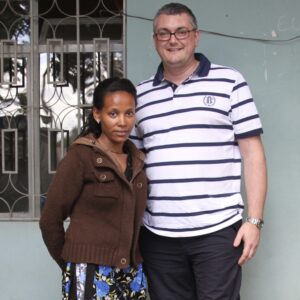
From your perspective, what are the key challenges that the global One Health movement faces (this may be in relation to the Sustainable Development Goals, Global Health Security, and any other key global agendas)?
The world has changed immeasurably since the SARS-CoV-2 (COVID19) pandemic. The general public have a greater awareness of vaccination, zoonoses, lockdown, herd immunity, biosecurity, food security, animal welfare – maybe even ‘One Health’ – but that awareness doesn’t always correlate with understanding of these topics. And when I mention general public, I’m including the media and politicians too! We still have a long way to go to foster real collaboration in a lot of areas. For example, lots of countries have national and regional AMR Action Plans and these are often incredibly innovative and well meaning. But they need to be bolstered by the investment necessary to regulate the distribution, prescription and supply of antibiotics for people and animals so that we can really drive reduction, refinement and replacement of antibiotic use and genuinely improve antibiotic stewardship. One Health approaches can and should be applied to a whole host of challenges – AMR, development of novel medicines, tackling infectious diseases, mitigating against the effects of climate change, feeding a growing global population, improving understanding of non- communicable diseases and mental wellbeing… but investment needs to follow the development of strategy and policy to put One Health into Action!
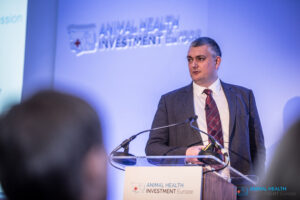
What do you think are the solutions to these challenges?
A lot of organisations in the public and private sectors are jumping onto the One Health bandwagon. It’s a fabulous buzzword and makes a catchy title for a seminar or conference! But education and improving awareness are core to developing One Health further. I was an ad hoc expert in One Health for the World Veterinary Association when I was charged with establishing a working group specifically looking at One Health Education. Over the last 5yrs, I’ve had the great privilege of getting to know and work along Dr Deborah Thomson, a veterinarian based in Washington DC who founded One Health Lessons, an organisation which develops lessons for ‘One Health Lesson Leaders’ to teach to school-age children around the world. We also need to continue to work ‘top-down’ and lobby governments – alongside the Quadripartite of WHO, WOAH, FAO & UNEP – to embed One Health and sustainability principles in national and regional policy formulation. Promoting real cross-government communication and stimulating real engagement with non-government stakeholders across multiple disciplines is going to be key to tackling these challenges. Remember, most of the definitions of One Health include the interconnectedness of people, animals, plants and their shared environment… they refer to local, regional and national contexts… and they refer to action around communication, collaboration and education… across and between disciplines. Once we’ve embedded the case for One Health, then we need to move on securing investment to fund action.
In your professional experience especially as a lecturer, how do you believe students and young professionals can actively contribute to the global One Health movement?
I always remind my students that they aren’t just learning information to pass exams and gain a degree qualification! I hope that my students will become advocates for One Health and that they’ll move into their careers approaching problems with a One Health mindset. I believe that students and young professionals today are much more aware and practised in group-work and team-thinking that my generation and the generations that went before me. It’s also important that our graduates are ambassadors for One Health and that they play their part in spreading the word about the benefits of the One Health approach.
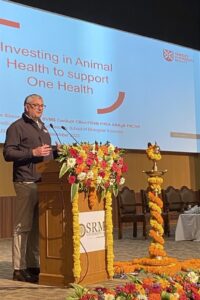
On personal reflection, what has been the most rewarding aspect or accomplishment in your One Health work?
We’re all on a journey – when I look back over the last 5-10 years, I’m thrilled to reflect on how far we’ve come, in helping people to understand what sustainability means in their normal day-to-day lives and how collaboration in the spirit of One Health can help us to achieve our goals – and that can be about challenging one another about food waste in our own homes right up to national action plans for AMR. I’ve helped Ripple Effect to think about their work through a One Health lens and led the creation of the BVA Sustainable UK Fin Fish Aquaculture policy position but there are many other opportunities I’ve had to present on One Health & sustainability which are very memorable. But, I’d like to single out the formation of the UK One Health Coordination Group and the compilation of the BVA One Health in Action report – this really formed the basis for a lot of the other One Health advocacy I’ve been involved with in the UK – I’m indebted to everyone who engaged with that group and helped get it up and running, and are now continuing the dialogue between UK One Health stakeholders.
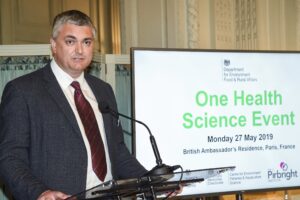
If you were omnipotent for a day and you have the ability to make changes to various One Health issues, what would you tackle first?
Tackling antimicrobial resistance is probably the issue that springs to mind due to my own personal interests… particularly improved, rapid point-of-care / pen-side diagnostics that will enable us to make decisions on whether we need to use antimicrobials or not and, if we do, which narrow-spectrum antibiotic is likely to be the most effective. That technology, coupled with much tighter regulation on the supply and use of antibiotics… that would be a fabulous day! However, the other One Health challenge I’d really like to see completed is the global elimination of dog-bite associated rabies – we’ve been so close for so long, it would be fabulous to see that get over the line.
How do you feel about receiving the World Veterinary Association (WVA) Award for One Health? What is the significance of this award to you?
I am truly humbled to receive the WVA Award and I receive it recognising the tremendous support that I’ve had on my ‘One Health & sustainability crusade’ over the last decade and more. From the North of Ireland Veterinary Association and the British Veterinary Association to the Federation of Veterinarians of Europe and the World Aquatic Veterinary Medical Association. From Ripple Effect and Vet Sustain to One Health Lessons and Queen’s University… and even WVA itself… as well as all of the One Health stakeholders and collaborators along the way this award is for all those individuals and organisations too.
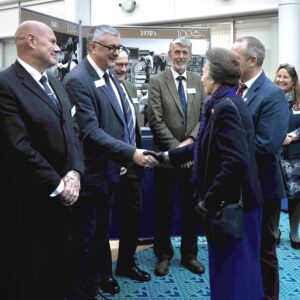
How do you manage the demands of your work while also prioritizing a healthy work-life balance and finding ways to relieve stress?
If I’m being really honest – and my family will confirm it – this is my weak spot! I’m not good at saying ‘no’ and switching off from work, so the balance isn’t always healthy. But I do ring fence time with my family – my eldest son, Callum, graduated last Summer and is a trainee chartered accountant in Liverpool. My second son, Lewis, is studying for A-Levels and my daughter, Isla, is at primary school. At the weekends, I’m often beside a rugby or hockey pitch watching them play. Having a playful and energetic Springer Spaniel, Muck, ensures that I get out for regular walks in nature with a good blast of fresh Northern Irish air!
Aside from lots of One Health work, what do you do for fun or hobbies?
I really enjoy cooking – I find it relaxing to put on some music and prepare a meal for friends and family. I’m also actively involved with my Church congregation in Co Down. I enjoy photography but, recently, I haven’t had as much time for it as I would’ve liked.
Thank you for taking the time to share your valuable insights with us, Dr. Simon Doherty. Your thoughtful responses contribute to our mission of promoting awareness and understanding of One Health principles. Best wishes for your future endeavours from the entire OHDI team!


